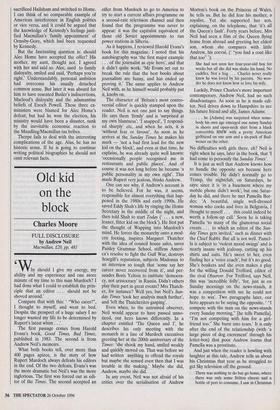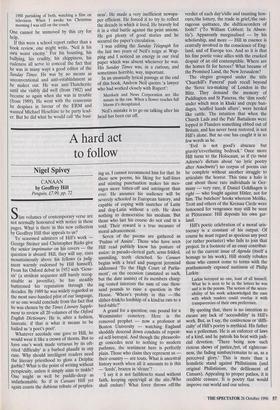Old kid on the block
Charles Moore
FULL DISCLOSURE by Andrew Neil Macmillan, £20, pp. 481 Why should I give my energy, my ability and my experience and one more minute of my time to this man Murdoch? I had done what I could to establish the prin- ciple that an editor . . . should not be shoved around.'
Compare that with this: "Who cares?", I thought to myself, and went to bed. Despite the prospect of a huge salary I no longer wanted my life to be determined by Rupert's latest whim ...'
The first passage comes from Harold Evans's book, Good Times, Bad Times, published in 1983. The second is from Andrew Neil's memoirs.
What both books tell, over more than 400 pages apiece, is the story of how Rupert Murdoch always defeats his editors in the end. Of the two defeats, Evans's was the more dramatic but Neil's was the more inglorious. The first was forced out as edi- tor of the Times. The second accepted an offer from Murdoch to go to America to try to start a current affairs programme on a second-rate television channel and then found that the programme was never to appear: it was the capitalist equivalent of those old Soviet appointments to run power stations in Siberia.
As it happens, I reviewed Harold Evans's book for this magazine. I noted that his autobiography was 'the first major example . . . of the journalist as epic hero', and that it didn't quite work: 'Mr Evans set out to break the rule that the best books about journalism are funny, and has ended up proving it.' The same applies to Andrew Neil with, as he himself would probably put it, knobs on.
The character of `Britain's most contro- versial editor' is quickly stamped upon the reader. Neil is not one just to say things. He says them 'firmly' and is 'surprised at my own bluntness': 'I snapped', 'I respond- ed sharply' etc, and when he acts, it is `without fear or favour'. As soon as he arrives at the Sunday Times he makes his mark — 'not a bad first lead for the new kid on the block', and even at that time, he explains, he was already quite well known: `occasionally people recognised me in restaurants and public places'. And of course it was not long before he became 'a public personality in my own right'. This made Rupert very jealous, thinks Andrew.
One can see why, if Andrew's account is to be believed. For he was, it seems, responsible for almost everything that hap- pened in the 1980s and early 1990s. He saved Eddy Shah's life by ringing the Home Secretary in the middle of the night, and then told Shah to start Today (` . . . a new, leaner, fitter kid on the block'). He first put the thought of Wapping into Murdoch's mind. He forces the monarchy onto a mod- ern footing, inspires Margaret Thatcher with the idea of council house sales, saves Paisley Grammar School, stiffens Ameri- ca's resolve to fight the Gulf War, destroys Scargill's reputation, subjects Madonna to an interview so tough that 'some say her career never recovered from it', and per- suades Boris Yeltsin to institute `democra- cy, not aristocracy' in Russia. Didn't others play their part in great events? Mrs Thatch- er, for instance? Well yes, but Neil's Sun- day Times 'took her analysis much further', and 'left the Thatcherites gasping'.
Even when, to the untrained observer, Neil would appear to have passed unno- ticed, our hero knows differently. In a chapter entitled 'The Queen and I', he describes his only meeting with the monarch in a line of Murdoch executives greeting her at the 200th anniversary of the Times: 'she shook my hand, smiled weakly and quickly moved on. That was before we had written anything to offend the royals but maybe she sensed even then that I was trouble in the making.' Maybe she did, Andrew, maybe she did.
In any event, Neil was not afraid of his critics over the serialisation of Andrew Morton's book on the Princess of Wales, he tells us. But he did fear his mother, a royalist. Yet she supported her son, explaining, on the telephone, that 'it's all the Queen's fault'. Forty years before, Mrs Neil had seen a film of the Queen flying home from abroad and greeting her eldest son, whom she compares with little Andrew, his coeval, (` "you had a coat like that too" '):
She had not seen her four-year-old boy for weeks but all she did was shake his hand. No cuddles. Not a hug . . . Charles never really knew he was loved by his parents. No won- der he does not know how to love his wife.
Luckily, Prince Charles's more important contemporary, Andrew Neil, had no such disadvantages. As soon as he is made edi- tor, Neil drives down to Hampshire to see his future friend and ally, James Adams: . . . he [Adams] was surprised when some- body his own age emerged one sunny Sunday in shorts and open-neck shirt from a black convertible BMW with a pretty American girlfriend on one arm and a six-pack of Bud- weiser on the other.
No difficulties with girls there, eh? Neil is right when he says, later in the book, that 'I had come to personify the Sunday Times'.
It is just as well that Andrew knows how to handle the opposite sex because here comes trouble. He didn't normally go to Tramp, the nightclub, on Saturdays, he says; since it is 'in a basement where my mobile phone didn't work'; but one Satur- day he did, and there he met Pamella Bor- des: 'A beautiful, single well-dressed woman who cooks and lives in Belgravia, I thought to myself . . . this could indeed be worth a follow-up call.' Soon he is taking Pamella 'to many of the glamorous social events .. . to which an editor of the Sun- day Times gets invited,' such as dinner with the Chief Rabbi. But all is not well. Pamel- la is subject to 'violent mood swings' and is nearly insane with jealousy, cutting up his shirts and suits. He's sweet to her, even finding her a 'voice coach', but it's no good. She's bonkers and she even makes a play for the willing Donald Trelford, editor of the rival Observer. For Trelford, says Neil, this was 'incredible folly', `for, just as on Sunday mornings on the news-stands, it was a competition with me he could not hope to win'. Two paragraphs later, our hero appears to be saying the opposite. "I compete with the man on the news-stands every Sunday morning," [he tells Pamella], "I'm not competing with him for a girl- friend too." She burst into tears.' It is only after the end of the relationship (with 'a large piece of dog excrement' through his letter-box) that poor Andrew learns that Pamella was a prostitute.
And just when the reader is howling with laughter at this tale, Andrew tells us about his Christmas that year as he struggled to get Sky television off the ground:
There was nothing to do but go home, where there was only some Stilton cheese and a bottle of port to consume. 1 saw in Christmas 1988 partaking of both, watching a film on television. When I awoke von Christmas morning I was still on the couch.
One cannot be unmoved by this cry for help.
If this were a school report rather than a book review, one might write, 'Neil is his own worst enemy.' For his boasting, his bullying, his crudity, his chippiness, his rudeness all serve to conceal the fact that he was in many ways a good editor of the Sunday Times. He was by no means as unconventional and anti-establishment as he makes out. He was anti-Thatcherite until she visibly did well (from 1982) and became so again when she was in trouble (from 1989). He went with the consensus he despises in favour of the ERM and wanted Michael Heseltine to be party lead- er. But he did what he would call 'the busi- ness'. He made a very inefficient newspa- per efficient. He forced it to try to reflect the decade in which it lived. He bravely led it in a vital battle against the print unions. He got plenty of good stories and he secured the paper's circulation.
I was editing the Sunday Telegraph for the last two years of Neil's reign at Wap- ping and I noticed an energy in our rival paper which was absent whenever he was. His Sunday Tunes was, in a curious, and sometimes horrible, way, important, In an unusually lyrical passage at the end of this book, Andrew Neil quotes 'a lawyer who had worked closely with Rupert': Murdoch and News Corporation are like nature in the raw. When a flower reaches full bloom it's decapitated.
Neil's mistake is to go on talking after his head has been cut off.



















































































 Previous page
Previous page